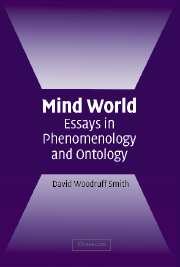Book contents
- Frontmatter
- Contents
- Prolegomena: The Terroir of Consciousness and the World
- Origins of the Essays
- Overview: A Story Line
- The Picture
- 1 Three Facets of Consciousness
- 2 The Cogito circa a.d. 2000
- 3 Return to Consciousness
- 4 Consciousness in Action
- 5 Background Ideas
- 6 Intentionality Naturalized?
- 7 Consciousness and Actuality
- 8 Basic Categories
- Coda: The Beetle in the Box
- Appendix: Background Conceptions of Ontology, Phenomenology, Philosophy of Mind, and Historical Philosophy
- Index
- References
Coda: The Beetle in the Box
Published online by Cambridge University Press: 05 June 2012
- Frontmatter
- Contents
- Prolegomena: The Terroir of Consciousness and the World
- Origins of the Essays
- Overview: A Story Line
- The Picture
- 1 Three Facets of Consciousness
- 2 The Cogito circa a.d. 2000
- 3 Return to Consciousness
- 4 Consciousness in Action
- 5 Background Ideas
- 6 Intentionality Naturalized?
- 7 Consciousness and Actuality
- 8 Basic Categories
- Coda: The Beetle in the Box
- Appendix: Background Conceptions of Ontology, Phenomenology, Philosophy of Mind, and Historical Philosophy
- Index
- References
Summary
I found a little beetle, so that Beetle was his name,
And I called him Alexander and he answered just the same.
I put him in a match-box, and I kept him all the day …
And Nanny let my beetle out –
… And Beetle ran away.
We went to all the places which a beetle might be near,
And we made the sort of noises which a beetle likes to hear,
And I saw a kind of something …
It was Alexander Beetle I'm as certain as can be
And he had a sort of look as if he thought it must be ME.
A. A. Milne, “Forgiven”Now someone tells me that he knows what pain is only from his own case! – Suppose everyone had a box with something in it: we call it a “beetle.” No one can look into anyone else's box, and everyone says he knows what a beetle is only by looking at his beetle. – Here it would be quite possible for everyone to have something different in his box. One might even imagine such a thing constantly changing. – But suppose the word “beetle” had a use in these people's language? – If so it would not be used as the name of a thing. The thing in the box has no place in the language-game at all; not even as a something: for the box might even be empty. – No, one can “divide through” by the thing in the box; it cancels out, whatever it is. […]
- Type
- Chapter
- Information
- Mind WorldEssays in Phenomenology and Ontology, pp. 283 - 288Publisher: Cambridge University PressPrint publication year: 2004



